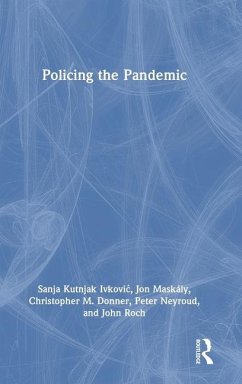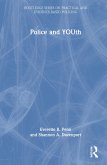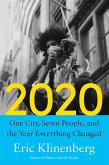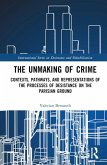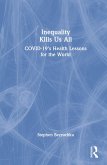This book explores how police agencies in United Kingdom and the United States have adjusted to their changing environments, both during the peak of the COVID-19 pandemic and later, when the restrictions have been relaxed and the societies have begun to develop their new normal.
Hinweis: Dieser Artikel kann nur an eine deutsche Lieferadresse ausgeliefert werden.
Hinweis: Dieser Artikel kann nur an eine deutsche Lieferadresse ausgeliefert werden.
"This book offers the most comprehensive investigation and authoritative source to date on the impact of the COVID-19 pandemic on policing. The world class team of authors do an amazing job of synthesizing all of this material into an accessible manner for all readers, including academics, researchers, students, practitioners, and the public. It is indeed a fine contribution to science, and it belongs on the shelves, or better yet, in the hands of all who have a scholarly, professional, or general interest in policing."
Professor Wesley G. Jennings, Department of Criminal Justice & Legal Studies, University of Mississippi, USA; Co-Editor, Policing: An International Journal
"The next significant health or climate crisis, unfortunately, is inevitable. This book is a must-read for law enforcement agencies seeking to learn from the COVID pandemic to strengthen their understanding, resilience, and planning for similar sentinel events in the future."
Professor Cythia Lum, Center for Evidence-Based Crime Policy, George Mason University, USA
"Written by an international group of distinguished scholars and police leaders, the book is aptly dedicated to police and first responders throughout the world: a tribute to the work of the frontliners during the generation-defining pandemic that swept across the globe in early 2020. As a disruption to the world like we had never seen before, policing the pandemic challenged police and first responders to think and act in ways they had never quite imagined before. This book explores the full gamut of how the pandemic impacted on police and policing: how police in different parts of the world stepped up to the new and complex demands, how agencies altered their organizational and operational practices, how the pandemic affected officer wellness and how the culture within their organizations were forever changed. The book reports on original survey research, conducted across the UK and US to better understand firsthand how the pandemic was experienced by police on the frontlines. Arguably the biggest takeaway from the book is how important organizational leadership and culture was to the lived experience of police dealing with the rapidly changing COVID-19 rules and procedures that was theirs to enforce. Police in both the UK and US experienced significant stress and concern about bringing COVID-19 into their own families. On the whole, the book shows that police in the US experienced significant morale worsening through the pandemic relative to their UK peers, yet police officers from both countries were unanimous in saying that the police morale and confidence in the police administration suffered as a result of the pandemic and various organizational changes. The authors conclude that policing the pandemic was a shared, and generally negative experience for police at the frontlines. Thoughtfully, the authors conclude with some practical and insightful recommendations to police agencies in preparation for future emergencies."
Professor Lorraine Mazerolle, School of Social Science, The University of Queensland, Australia
"An incredibly comprehensive and in-depth comparative assessment of the varying approaches employed by police agencies within the UK and USA in response to the pandemic. Conceptually sound and empirically driven, the authors tackle a wide range of topics and ever evolving external and internal challenges (e.g., health, political, economic, scientific, occupational, operational, professional, personal, etc.), for which agencies and individual officers were forced upon to adapt - as policing is an enterprise without the option of simply shutting down or moving to a fully work at home modality. The lived experiences of the officers captured in the book illustrate the toll that a crisis at the scale of COVID-19 inflicts, but also importantly offers lessons on how to better respond to future crises. While there was no prior 'playbook for a global pandemic' as one police supervisor noted, Policing the Pandemic lays a foundation moving forward."
Professor William Terrill, School of Criminology & Criminal Justice, Arizona State University, USA; Co-Editor, Policing: A Journal of Policy & Practice
"Policing the Pandemic is the most comprehensive examination of pandemic policing available. It uses both quantitative and qualitative data to tell us about how UK and US police departments responded to the pandemic, and provides thoughtful insights re how the reactions in police agencies in both countries differed, and why they differed. This is a must read for both scholars and practitioners."
Professor David Weisburd, Institute of Criminology, Faculty of Law, Hebrew University, Israel
Professor Wesley G. Jennings, Department of Criminal Justice & Legal Studies, University of Mississippi, USA; Co-Editor, Policing: An International Journal
"The next significant health or climate crisis, unfortunately, is inevitable. This book is a must-read for law enforcement agencies seeking to learn from the COVID pandemic to strengthen their understanding, resilience, and planning for similar sentinel events in the future."
Professor Cythia Lum, Center for Evidence-Based Crime Policy, George Mason University, USA
"Written by an international group of distinguished scholars and police leaders, the book is aptly dedicated to police and first responders throughout the world: a tribute to the work of the frontliners during the generation-defining pandemic that swept across the globe in early 2020. As a disruption to the world like we had never seen before, policing the pandemic challenged police and first responders to think and act in ways they had never quite imagined before. This book explores the full gamut of how the pandemic impacted on police and policing: how police in different parts of the world stepped up to the new and complex demands, how agencies altered their organizational and operational practices, how the pandemic affected officer wellness and how the culture within their organizations were forever changed. The book reports on original survey research, conducted across the UK and US to better understand firsthand how the pandemic was experienced by police on the frontlines. Arguably the biggest takeaway from the book is how important organizational leadership and culture was to the lived experience of police dealing with the rapidly changing COVID-19 rules and procedures that was theirs to enforce. Police in both the UK and US experienced significant stress and concern about bringing COVID-19 into their own families. On the whole, the book shows that police in the US experienced significant morale worsening through the pandemic relative to their UK peers, yet police officers from both countries were unanimous in saying that the police morale and confidence in the police administration suffered as a result of the pandemic and various organizational changes. The authors conclude that policing the pandemic was a shared, and generally negative experience for police at the frontlines. Thoughtfully, the authors conclude with some practical and insightful recommendations to police agencies in preparation for future emergencies."
Professor Lorraine Mazerolle, School of Social Science, The University of Queensland, Australia
"An incredibly comprehensive and in-depth comparative assessment of the varying approaches employed by police agencies within the UK and USA in response to the pandemic. Conceptually sound and empirically driven, the authors tackle a wide range of topics and ever evolving external and internal challenges (e.g., health, political, economic, scientific, occupational, operational, professional, personal, etc.), for which agencies and individual officers were forced upon to adapt - as policing is an enterprise without the option of simply shutting down or moving to a fully work at home modality. The lived experiences of the officers captured in the book illustrate the toll that a crisis at the scale of COVID-19 inflicts, but also importantly offers lessons on how to better respond to future crises. While there was no prior 'playbook for a global pandemic' as one police supervisor noted, Policing the Pandemic lays a foundation moving forward."
Professor William Terrill, School of Criminology & Criminal Justice, Arizona State University, USA; Co-Editor, Policing: A Journal of Policy & Practice
"Policing the Pandemic is the most comprehensive examination of pandemic policing available. It uses both quantitative and qualitative data to tell us about how UK and US police departments responded to the pandemic, and provides thoughtful insights re how the reactions in police agencies in both countries differed, and why they differed. This is a must read for both scholars and practitioners."
Professor David Weisburd, Institute of Criminology, Faculty of Law, Hebrew University, Israel

